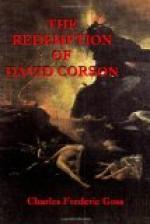This corrupted judge, this faithless lover, this dishonorable parent, had become accustomed to dull misery; but this fierce onslaught of an avenging sense of personal unworthiness and dread of divine justice was more than he could bear. Life had long since lost its charms and he had more than once seriously contemplated suicide.
“There seems to be no use in trying to beat nature in any other way, and so I will try the dernier resort,” he said aloud. Opening his pocket knife, he cut a piece of rope from the flagstaff, looked around, found a heavy bar of iron, and fastened rope and weight together. In one end of the rope he made a noose, slipped it over his neck, approached the railing and leaned upon it to reflect. His mind now went back into the still more remote past; he was a boy again, and at his mother’s knee. Half audibly and half unconsciously, he began murmuring, “Now I lay me down to sleep, I pray—no—I’ll be consistent,” he added, with a sigh. “I have lived without the mummery of prayer, and I will die without it.”
And then by one of those strange freaks of the mind that make people do the most absurd things at the most sacred times—mourners laugh at funerals, and soldiers in the thick of battles long for puddings—he began to say over that old doggerel which he used to repeat when shivering on the spring-board over the cold waters of the Hudson river:
“One, two, three,
the bumble bee,
The rooster crows and
away she goes!”
The absurdity of so trivial a memory at such a serious moment excited his sense of humor, and he smiled.
By this time the violence of his remorse had begun to subside and proved to be only a fitful, fleeting protest of that abused and neglected moral sense. Something more terrible than even this discovery of the wrong done to his own son would have to come. There was plenty of time! Nature was in no haste! This was only a warning, a little danger signal.




